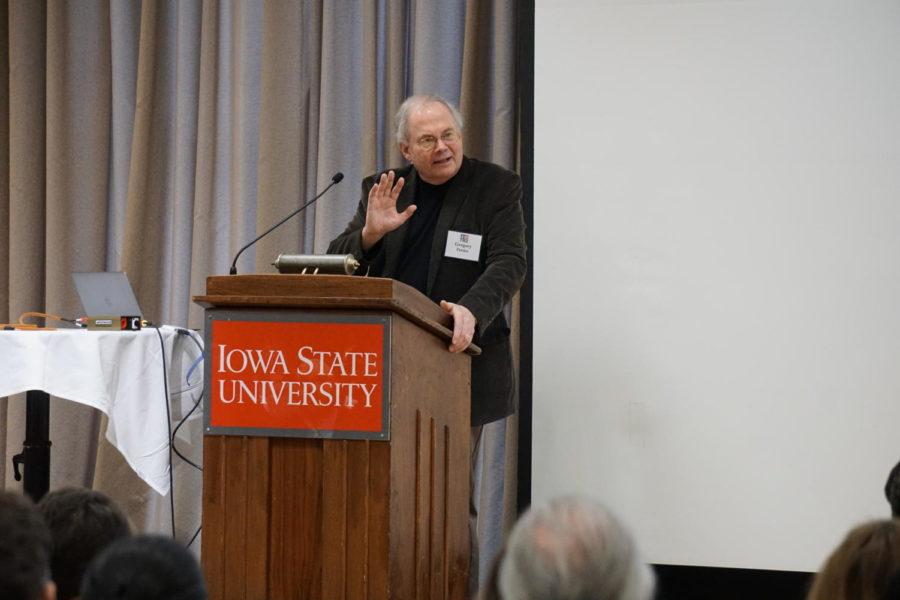Iowa State Research Day keynote discusses blurring educational borders
Megan Petzold/ Iowa State Daily
Keynote speaker Gregory Petsko spoke at Iowa State’s second annual Research Day on March 27th. Petsko spoke to the audience mainly about how the most educated people were more artistically driven than science driven, and colleges should encourage students to get the most rounded education they can. He mentions that the most famous science institutions sought out the most creative and imaginative people, no matter their pedigree.
March 27, 2018
The keynote speaker at this year’s second annual Iowa State Research Day accentuated the theme of this year’s event: Discover. Create. Together.
Gregory Petsko delivered the keynote address, titled “Science and the Arts/Humanities: A Marriage Made in Heaven,” in the Sun Room of the Memorial Union Tuesday.
Petsko is currently the biochemistry department chair at Brandeis University and also has an endowed professorship at Weill Cornell Medical College and is an adjunct professor at Cornell University.
His keynote speech focused on how science and arts and humanities must work together to be most successful and Petsko presented many examples of why throughout the talk.
Senior Vice President and Provost Jonathan Wickert opened the keynote with a few remarks of his own, touching on the importance of Iowa State’s Research Day and the theme this year.
“Research is not an island on campus, nor is education or extension,” Wickert said. “Our philosophy at ISU is that all of these are complimentary and the research enterprise enhances what we do in the classroom.”
Petsko’s keynote began by presenting a number of well known and successful scientific institutes, such as the Institute for Advanced Study in Princeton, New Jersey.
Each of these successful institutes have common traits, Petsko said, and the most important of these being a focus on hiring people “with a high degree of curiosity and imagination” above all else.
“I think [these traits] are telling because we have created a culture in this country, both in academia and in industry, that actually tries very hard to select against most of these characteristics,” Petsko said.
Along with creativity and imagination, Petsko discussed the importance of science, and scientists, having an interest in arts and humanities. An interest that at times might trump their interest in science.
Petsko himself — a leading scientist in the treatment of neurodegenerative diseases — majored in literature in college, along with his secondary major in chemistry.
Scientists like Abraham Flexner, who founded the Institute for Advanced Study, did not even have a doctorate degree, Petsko said. But he focused on innovation and curiosity and was very interested in the arts.
Petsko also discussed famous Renaissance men, like Galileo, Michelangelo and Leonardo da Vinci, and how they all had interests that spanned across subjects, from painting to architecture to anatomy and even engineering.
“[Arts and humanities] courses taught me all the things that have been of most value to me in my pursuit of the truth,” Petsko said.
Without arts and humanities, science has the potential to grow cold and dangerous, said Petsko.
Petsko addressed the current system of education, specifically higher education, in the country, and how he believes it is not working. He thinks that the idea that someone who is a science, technology, engineering and math (STEM) major should prioritize and take a majority of STEM is false.
There are three laws that Petsko has:
- You can’t cut your way to excellence.
- A university is not a business.
- There’s no such thing as useless information.
Petsko also warned against current trends going on in higher education today that lawmakers are pushing towards the prioritization of STEM majors. He showed the audience a number of statements made by lawmakers this year about the subject, including a statement from Marco Rubio in 2015 where he said that “we need more welders and less philosophers.”
Petsko said that the fight of balancing science with arts and humanities is one that is still ongoing today.
“I think we are at a time in this country where there is a battle going on between those who would try to change the educational system in a way that it must never be changed,” Petsko said, “and those of us who education in its broadest terms, that the only way we can have the kind of creativity and innovation in the sciences that we want is by never forgetting the arts and humanities and their importance for scientists and engineers as well as people who major in those subjects.
“That battle is being fought everyday in every state in this country right now, and all of us must get involved.”
















